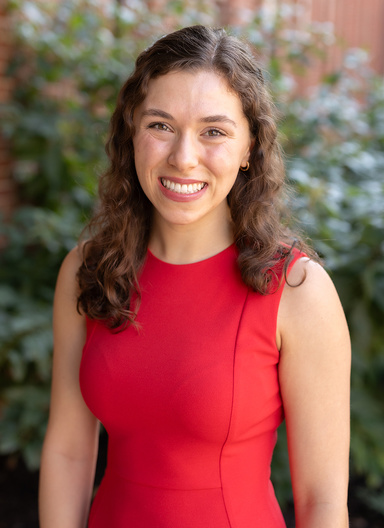The University of Iowa’s Audiology Graduate Program is ranked second in the nation, according to U.S. News and World Report.
This lofty, and well-deserved, ranking caught the eye of graduate student Hailey Kingsbury, who enrolled at the UI after earning her bachelor’s degree in Speech Pathology and Audiology from Miami University in Oxford, Ohio.
“There’s really a strong community of professors and clinical instructors. They are super supportive and want to see you excel,” Kingsbury says. “You get some unique opportunities. We are connected to UI Hospitals and Clinics, so I got to witness a cochlear implant surgery. You get hands-on things like that sometimes. Iowa also gives funding to students in terms of assistantships. For me, that was huge.”
Capstone Project
Fast forward a few years, Kingsbury is completing her capstone project under the mentorship of Associate Professor Elizabeth Walker, investigating factors that influence audiometric thresholds in preschoolers.

“When we are testing their hearing, they are generating a lot of self-generated noise such as coughing and breathing. Adults can suppress that better,” says Kingsbury, who works in Walker’s Pediatric Audiology and Language Laboratory. “We’re looking at how self-generated noise – considering factors such as attention and age - and ear canal acoustics influence audiometric thresholds in preschoolers. That way we can try to fine tune our assessments to help identify children with mild hearing loss at an earlier age.”
Kingsbury has completed her subject testing, using experimental audiometry – FASTRAK audiometry -- that is unique in the way the child’s noise is being measured at the level of their ear and calibrated to their ear. With clinical audiometry, the child listens to quiet sounds through earphones and the clinician measures thresholds based on the child’s responses. With preschoolers, clinicians can measure thresholds while the child plays a game.
“Now the project is moving to the clinical phase to see if this is something we can implement into clinics across the nation,” Kingsbury says. “FASTRAK audiometry can make sure we are assessing children accurately, because children’s ear canals are all different sizes and volumes, and do not match the 2cc coupler calibration of a normal audiometer. Since this calibration is not very accurate for pediatric patients, this makes the assessment more difficult.
“What we’re doing is extremely novel and unique. This can really help improve identification, diagnosis, and intervention of children with hearing loss.”
National NSSLHA leadership
Walker asked Kingsbury if she wanted to work with the National Student Speech Language Hearing Association (NSSLHA) on the national level. At first, Kingsbury didn’t feel qualified to engage with students nationally through advocacy work.
Kingsbury’s mentor had a different opinion on her student’s leadership talents.
“When I first met Hailey, it was immediately apparent that she had a great talent for advocacy,” Walker says. “She’s willing to speak up and articulate her viewpoint on different topics, but she is also good at listening to people who may have opposing views and find a common ground. She’s also very humble, which I think is an important skill for someone in a leadership role. I could tell that she would be able to make significant contributions in our profession, not just within our department, but also at a national level.”
Last summer, Kingsbury was named National NSSLHA’s new president.
“It's been amazing to work with our national office staff, my national advisor, and my team of 11 executive council members,” Kingsbury says. “The goal is to make audiology and speech language pathology a diverse and inclusive field that represents the students and the patients that we serve. We are making sure students have access to scholarships, a strong community on the local and national level, advocacy involvement, and professional development workshops.”
Life-changing volunteer work
Kingsbury also enjoys volunteering with local organizations such as leading outreach events for University of Iowa Sound Awareness for Everyone (UI-SAFE).
In June - July 2023, she was a graduate assistant for the Iowa Summer Writing Festival. Her responsibilities included coordinating accessibility needs of participants, managing social media and creating content, hosting events, and providing technical support for instructors and participants, and Festival management.
Kingsbury describes volunteering working for the Iowa Summer Writing Festival as a life-changing experience. She met people from different walks of life, which has had a big impact on her life and made her an even better clinician.
“It's provided me with a more comprehensive understanding of the patient experience. When we see a patient within the four walls of our clinic, we often are addressing their needs within that time and space,” Kingsbury says. “Working at the Festival, I saw what environments my patients may be in and how I can serve them. That experience has really made me understand the importance of meeting patients where they're at and figuring out what's important in their life. I don't want the care I provide to be mediocre. I want to take my care to the next level.”
Kingsbury will graduate with both Master of Arts and Doctor of Audiology degrees in May 2025. After earning her doctorate, she wants to work with cochlear implant patients, preferably in a clinical setting.
“I love the 1-on-1 interactions with patients,” Kingsbury says. “I would love to become a clinical instructor where you get to serve patients and help train students. My goal comes from the mentorship I've had from my clinical instructors here.”